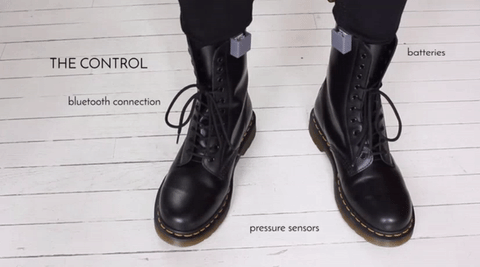An Artist Made A “third Thumb” For Your Hand That Makes Everything Easier









An artist made a “third thumb” for your hand that makes everything easier
follow @the-future-now
More Posts from Optimisticcloudgarden and Others
You need to ignore what everyone else is doing and achieving. Your life is about breaking your own limits and outgrowing yourself to live your best life. You are not in competition with anyone else. Plan to outdo your past, not other people.
(via barbellsandfortitude)

“45” by 25kartinok: http://bit.ly/2Iu8rTQ
📚 A massive tower of books: Your dream or nightmare? 📚
WHITE NOISE
General Topic : Science Why Does White Noise Help People Sleep? A white noise machine is the simplest solution to blocking out noise. On its face, flipping on white noise before hitting the sack must be the most counterintuitive idea out there. Want to sleep better? Simple solution: make a bunch of noise. Sweet dreams ahoy. And yet, not only do some people swear they can't get to sleep without a fan running, there are even companies that will sell you optimized noise-makers for helping you get the best of your bed rest. What is up with our brains and our ears? The short answer: white noise is betternoise. At least for (some) sleepers. White noise, if you're using the technical definition, is a consistent noise that comes out evenly across all hearable frequencies. Say you're a musician. To play a middle C note, you play something that's about 261.6 hertz, the unit of frequency. White noise is just an equal amount at every frequency, from low to high, that a human being can hear. To keep the music analogy going, it's a gigantic band all playing a slightly different note. (Machines pushed to the limit, like fans, are especially good at hitting these notes.) When a noise wakes you up in the night, it's not the noise itself that wakes you up, per se, but the sudden change or inconsistencies in noise that jar you. White noise creates a masking effect, blocking out those sudden changes that frustrate light sleepers, or people trying to fall asleep. "The simple version is that hearing still works while you're asleep," says Seth S. Horowitz, a neuroscientist and author of The Universal Sense: How Hearing Shapes the Mind. "This is why the majority of bedpartners prefer the constant white noise of a CPAP machine rather than their spouse’s crescendo-decrescendo snoring sounds," Clete A. Kushida, director of the Stanford Center for Human Sleep Research, writes in an email to Popular Science. Makes sense, right? But it's not always that straightforward.  For one thing, there's pink noise. There's some semi-complicated math involved, but essentially, pink noise is white noise, but with the higher frequencies turned down in intensity. White noise has equal power across all frequencies; pink noise comes out louder and more powerful on the lower ends of the sound spectrum. That could be helpful for people suffering from tinnitus, or who just find the upper registers of true white noise unpleasant. The noise family tree doesn't stop there, either: depending on which frequencies you tone down or up, you might also produce Brown noise, (named for a person, not a color) violet noise, and a mess of other colors. Different folks might prefer different sounds. And, of course, not everyone needs that noise. In some people, the masking effect of white noise can do the exact opposite of what it does for most people--actually increasing sensitivity to underlying sounds, Horowitz says. In the strange, not-totally-explained world of stochastic resonance, people are occasionally able to pick up noises "masked" with white noise better than they are at picking up the noise in total silence. But that's an explanation article for another time. You look like you need some rest. Credits: Colin Lecher February 17, 2014
If lady luck gets on my side, we're gonna rock this town alive.
Ricky Martin, 'She Bangs'





Good wood - um, I’m currently trying to work out if this is the coolest bit of tech that’s ever been on here…. I think it might just be. Beautiful, classy, classic but contemporary, it makes you feel like you’re from the 1940s, 1970s and 2020 all in one go. Yes please!
A particle here can affect one on the other side of the universe, instantaneously
When an electron meets its antimatter twin, a positron, the two are annihilated in a tiny flash of energy. Two photons fly away from the blast.
Subatomic particles like photons and quarks have a quality known as “spin”. It’s not that they’re really spinning – it’s not clear that would even mean anything at that level – but they behave as if they do. When two are created simultaneously the direction of their spin has to cancel each other out: one doing the opposite of the other.
Due to the unpredictability of quantum behaviour, it is impossible to say in advance which will go “anticlockwise” and the other “clockwise”. More than that, until the spin of one is observed, they are both doing both.
It gets weirder, however. When you do observe one, it will suddenly be going clockwise or anticlockwise. And whichever way it is going, its twin will start spinning the other way, instantly, even if it is on the other side of the universe. This has actually been shown to happen in experiment (albeit on the other side of a laboratory, not a universe).
Your heart is the size of a fist because you need it to fight.
Lora Mathis (via quotemadness)
“Most people do not listen with the intent to understand; they listen with the intent to reply.”
— Stephen R. Covey
But I must admit I miss you terribly. The world is too quiet without you nearby.
Lemony Snicket (via quotemadness)



In their newest video, the Slow Mo Guys recreated one of my favorite effects: vibration-driven droplet ejection. For this, they use a Chinese spouting bowl, which has handles that the player rubs after partially filling the bowl with water. By rubbing, a user excites a vibrational mode in the bowl. Watch the GIFs above and you can actually see the bowl deforming steadily back and forth. This is the fundamental mode, and it’s the same kind of vibration you’d get from, say, ringing a bell.
Without a high-speed camera, the bowl’s vibration is pretty hard to see, but it’s readily apparent from the water’s behavior in the bowl. In the video, Gav and Dan comment that the ripples (actually Faraday waves) on the water always start from the same four spots. That’s a direct result of the bowl’s movement; we see the waves starting from the points where the bowl is moving the most, the antinodes. In theory, at least, you could see different generation points if you manage to excite one of the bowl’s higher harmonics. The best part, of course, is that, once the vibration has reached a high enough amplitude, the droplets spontaneously start jumping from the water surface! (Video and image credits: The Slow Mo Guys; submitted by effyeah-artandfilm)
-
 catwolfsworld liked this · 1 month ago
catwolfsworld liked this · 1 month ago -
 carolineesnell liked this · 2 months ago
carolineesnell liked this · 2 months ago -
 starryeyedastronaut liked this · 2 months ago
starryeyedastronaut liked this · 2 months ago -
 sleep-all-day-everyday liked this · 2 months ago
sleep-all-day-everyday liked this · 2 months ago -
 comfyspecs liked this · 3 months ago
comfyspecs liked this · 3 months ago -
 moizsh10 liked this · 4 months ago
moizsh10 liked this · 4 months ago -
 chthonicmoth liked this · 5 months ago
chthonicmoth liked this · 5 months ago -
 tale-of-the-champion liked this · 11 months ago
tale-of-the-champion liked this · 11 months ago -
 organizedstuff reblogged this · 1 year ago
organizedstuff reblogged this · 1 year ago -
 core565236 liked this · 1 year ago
core565236 liked this · 1 year ago -
 sevyonekucar reblogged this · 1 year ago
sevyonekucar reblogged this · 1 year ago -
 morealias liked this · 1 year ago
morealias liked this · 1 year ago -
 annoyingbitches liked this · 1 year ago
annoyingbitches liked this · 1 year ago -
 sad-mcswag liked this · 1 year ago
sad-mcswag liked this · 1 year ago -
 real-evil-genius reblogged this · 1 year ago
real-evil-genius reblogged this · 1 year ago -
 thirtheenprimes liked this · 1 year ago
thirtheenprimes liked this · 1 year ago -
 phoenixlionme reblogged this · 1 year ago
phoenixlionme reblogged this · 1 year ago -
 hmg621 reblogged this · 1 year ago
hmg621 reblogged this · 1 year ago -
 undeadobscurities liked this · 1 year ago
undeadobscurities liked this · 1 year ago -
 large-matcha-green-tea liked this · 1 year ago
large-matcha-green-tea liked this · 1 year ago -
 letssgolesbians liked this · 1 year ago
letssgolesbians liked this · 1 year ago -
 giftiaa liked this · 1 year ago
giftiaa liked this · 1 year ago -
 kadunud reblogged this · 1 year ago
kadunud reblogged this · 1 year ago -
 twosugersandadropofmilk reblogged this · 1 year ago
twosugersandadropofmilk reblogged this · 1 year ago -
 contr0lgroup liked this · 1 year ago
contr0lgroup liked this · 1 year ago -
 shotsofnovacaine liked this · 1 year ago
shotsofnovacaine liked this · 1 year ago -
 blueboldandbright liked this · 1 year ago
blueboldandbright liked this · 1 year ago -
 unionizecatgirls liked this · 1 year ago
unionizecatgirls liked this · 1 year ago -
 bondilluns liked this · 1 year ago
bondilluns liked this · 1 year ago -
 pauvrecamille liked this · 1 year ago
pauvrecamille liked this · 1 year ago -
 mariendall reblogged this · 1 year ago
mariendall reblogged this · 1 year ago -
 mariendall liked this · 1 year ago
mariendall liked this · 1 year ago -
 ammonium-water liked this · 1 year ago
ammonium-water liked this · 1 year ago -
 evilcatgirlwizard reblogged this · 1 year ago
evilcatgirlwizard reblogged this · 1 year ago -
 evilcatgirlwizard liked this · 1 year ago
evilcatgirlwizard liked this · 1 year ago -
 insectsys liked this · 1 year ago
insectsys liked this · 1 year ago -
 lord6-6fandom liked this · 1 year ago
lord6-6fandom liked this · 1 year ago -
 coffeeworldsasaki reblogged this · 1 year ago
coffeeworldsasaki reblogged this · 1 year ago -
 complicitsacrilege reblogged this · 1 year ago
complicitsacrilege reblogged this · 1 year ago -
 complicitsacrilege liked this · 1 year ago
complicitsacrilege liked this · 1 year ago -
 martian-night reblogged this · 1 year ago
martian-night reblogged this · 1 year ago -
 vislokawitch reblogged this · 1 year ago
vislokawitch reblogged this · 1 year ago -
 vislokawitch liked this · 1 year ago
vislokawitch liked this · 1 year ago -
 castametric liked this · 1 year ago
castametric liked this · 1 year ago -
 thanakite liked this · 1 year ago
thanakite liked this · 1 year ago -
 anakinsafterlife reblogged this · 1 year ago
anakinsafterlife reblogged this · 1 year ago